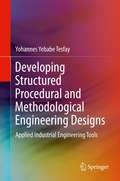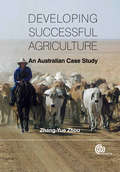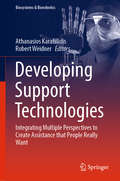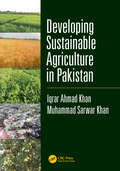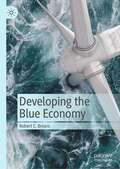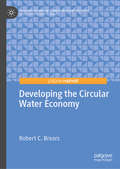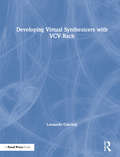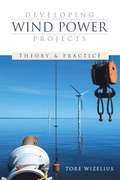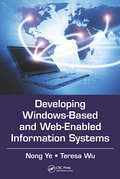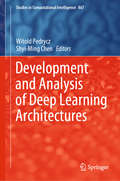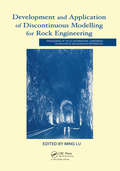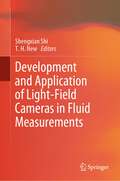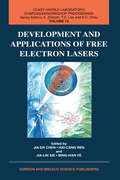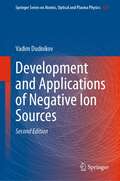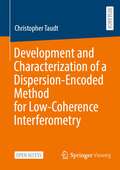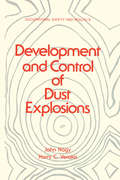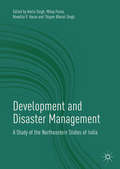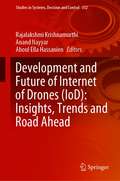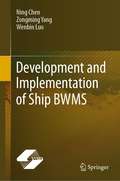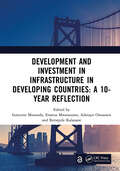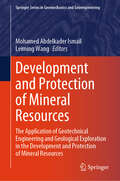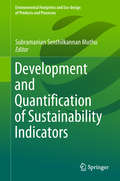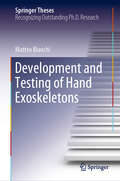- Table View
- List View
Developing Structured Procedural and Methodological Engineering Designs: Applied Industrial Engineering Tools
by Yohannes Yebabe TesfayThis book is designed to assist industrial engineers and production managers in developing procedural and methodological engineering tools to meet industrial standards and mitigate engineering and production challenges. It offers practitioners expert guidance on how to implement adequate statistical process control (SPC), which takes account of the capability to ensure a stable process and then regulate if variations take place due to variables other than a random variation. Powerful engineering models of new product introduction (NPI), continuous improvement (CI), and the eight disciplines (8D) model of problem solving techniques are explained. The final three chapters introduce new methodological models in operations research (OR) and their applications in engineering, including the hyper-hybrid coordination for process effectiveness and production efficiency, and the Kraljic-Tesfay portfolio matrix of industrial buying.
Developing Successful Agriculture
by Zhang-Yue ZhouAgriculture remains an important industry to both developed and developing economies. Unfortunately, many developing countries are still suffering from a lack of agricultural growth, especially those in Africa and South Asia. Australia's agricultural system has developed from almost non-existence 220 years ago to one of the most advanced and efficient in today's world. It is also one of the least distorted, receiving little government assistance. This book provides an updated and comprehensive account of a successful agricultural story, which can stimulate policy makers, researchers, agribusiness consultants and students to relate the Australian experience to their own agricultural development.
Developing Support Technologies: Integrating Multiple Perspectives to Create Assistance that People Really Want (Biosystems & Biorobotics #23)
by Athanasios Karafillidis Robert WeidnerThis book shows the advantages of using different perspectives and scientific backgrounds for developing support technologies that are integrated into daily life. It highlights the interaction between people and technology as a key factor for achieving this integration and discusses relevant methods, concepts, technologies, and applications suitable for interdisciplinary exchange and collaboration. The relationship between humans and technology has become much more inclusive and interdependent. This generates a number of technical, ethical, social, and practical issues. By gathering contributions from scholars from heterogeneous research fields, such as biomechanics, various branches of engineering, the social sciences, information science, psychology, and philosophy, this book is intended to provide answers to the main questions arising when support technologies such as assistance systems, wearable devices, augmented reality, and/or robot-based systems are constructed, implemented, interfaced and/or evaluated across different application contexts.
Developing Sustainable Agriculture in Pakistan
by Iqrar Ahmad Khan Muhammad Sarwar KhanAgriculture plays a pivotal role in the economy and development of Pakistan providing food to consumers, raw materials to industries, and a market for industrial goods. Unfortunately, agricultural production is stagnant due to several barriers including a fixed cropping pattern, reliance on a few major crops, a narrow genetic pool, poor seed quality, and a changing climate. In addition, the high cost of production, weak phytosanitary compliance mechanisms, and a lack of cold chain facilities makes Pakistan agriculturally uncompetitive in export markets. Despite all these issues, agriculture is the primary industry in Pakistan and small farmers continue to dominate the business. Small farmers grow crops for subsistence under a fixed cropping pattern and a holistic approach is required to develop agriculture to improve the livelihoods of the rural populace. This book presents an exhaustive look at agriculture in Pakistan. Chapters provide critical analyses of present trends, inadequacies in agriculture, strategic planning, improvement programs and policies while keeping in view the natural resources, plant- and animal-related agricultural production technologies, input supplies, population planning, migration and poverty, and balanced policies on finance, credit, marketing, and trade.
Developing the Blue Economy
by Robert C. BrearsTraditionally, the ocean economy is viewed solely as a mechanism for economic growth. In this business-as-usual approach, large-scale industrial economies have developed the ocean economy through the exploitation of maritime and marine resources, often without consideration of how those activities impact the future health or productivity of those same resources. This has led to aquatic ecosystems being viewed and treated as limitless resources; the marine environment becoming a dumping ground for waste; overfishing diminishing fishing stocks; ocean habitats being degraded from coastal developments; sea-level rise impacting coastal communities and infrastructure; increasing ocean acidification; and the marginalisation of poor coastal communities.Recognising the failings of the traditional ocean economy, there is a transition underway around the world towards the Blue Economy. This concept moves beyond the business-as-usual approach with economic development and ocean health complementary to one another. In the Blue Economy, the environmental risks of and ecological degradation from economic activity are mitigated or significantly reduced. Therefore, economic activity is in balance with the long-term capacity of the ocean ecosystems to support this activity and remain healthy and resilient. This book will provide an overview of the various technologies used to promote cross-sectoral and multi-scalar collaboration, facilitate the integrated management of sectors and resources, foster partnerships between governments and industry, encourage R&D in new technologies in resource use and management, and scale-up innovative financing mechanisms in the development of a Blue Economy. Also, the book will contain in-depth case studies that illustrate how locations, of differing climates, lifestyles and income levels, have implemented technologies to facilitate the development of the Blue Economy.Developing the Blue Economy will provide an accessible resource for practitioners and researchers working in the field on the various innovative technologies being implemented around the world to create a Blue Economy.
Developing the Circular Water Economy (Palgrave Studies in Climate Resilient Societies)
by Robert C. BrearsThis book presents new research on policy innovations that promote the development of the circular water economy. In contrast to the linear economy, the circular water economy promotes the reduction of water consumption, reuse of water, and recovery of resources from wastewater to not only increase resilience to climate change but also to reduce greenhouse gas emissions resulting from the provision of water and wastewater-related services. Providing a series of in-depth case studies of important locations in differing climates around the globe that have implemented a variety of policy innovations to develop the circular water economy, this book is a valuable resource for water and resource conservation managers, policymakers, international companies and organisations interested in the circular economy, environmental NGOs, researchers, as well as graduate and undergraduate students. · Systematically reviews policy innovations to develop the circular water economy· Illustrates how leading locations from around the world have developed the circular water economy to increase resilience to climate change while reducing emissions · Provides ‘best practices’ for other locations around the world aiming to implement the circular water economy
Developing Virtual Synthesizers with VCV Rack
by Leonardo GabrielliDeveloping Virtual Synthesizers with VCV Rack takes the reader step by step through the process of developing synthesizer modules, beginning with the elementary and leading up to more engaging examples. Using the intuitive VCV Rack and its open-source C++ API, this book will guide even the most inexperienced reader to master efficient DSP coding to create oscillators, filters, and complex modules. Examining practical topics related to releasing plugins and managing complex graphical user interaction, with an intuitive study of signal processing theory specifically tailored for sound synthesis and virtual analog, this book covers everything from theory to practice. With exercises and example patches in each chapter, the reader will build a library of synthesizer modules that they can modify and expand. Supplemented by a companion website, this book is recommended reading for undergraduate and postgraduate students of audio engineering, music technology, computer science, electronics, and related courses; audio coding and do-it-yourself enthusiasts; and professionals looking for a quick guide to VCV Rack. VCV Rack is a free and open-source software available online.
Developing Virtual Synthesizers with VCV Rack
by Leonardo GabrielliDeveloping Virtual Synthesizers with VCV Rack takes the reader step by step through the process of developing synthesizer modules, beginning with the elementary and leading up to more engaging examples. Using the intuitive VCV Rack and its open-source C++ API, this book will guide even the most inexperienced reader to master efficient DSP coding to create oscillators, filters, and complex modules.Examining practical topics related to releasing plugins and managing complex graphical user interaction, with an intuitive study of signal processing theory specifically tailored for sound synthesis and virtual analog, this book covers everything from theory to practice. With exercises and example patches in each chapter, the reader will build a library of synthesizer modules that they can modify and expand.Supplemented by a companion website, this book is recommended reading for undergraduate and postgraduate students of audio engineering, music technology, computer science, electronics, and related courses; audio coding and do-it-yourself enthusiasts; and professionals looking for a quick guide to VCV Rack. VCV Rack is a free and open-source software available online.
Developing Wind Power Projects: Theory and Practice
by Tore WizeliusWind power is developing rapidly, in terms of both the number of new installations and in interest from stakeholders including policy-makers, NGOs, research scientists, industry and the general public. Unlike the majority of other texts on wind power, which are written primarily for engineers or policy analysts, this book specifically targets those interested in, or planning to develop, wind power projects. Having outlined wind power basics and explained the underlying resource and technology, the author explores the interactions between wind power and society, and the main aspects of project development, including siting, economics and legislation. This book will be an essential reference for professionals developing new sites, government officials and consultants reviewing related applications, and both specialists and non-specialists studying wind power project development.
Developing Windows-Based and Web-Enabled Information Systems (Data-Enabled Engineering)
by Nong Ye Teresa WuMany professionals and students in engineering, science, business, and other application fields need to develop Windows-based and web-enabled information systems to store and use data for decision support, without help from professional programmers. However, few books are available to train professionals and students who are not professional progra
Development and Analysis of Deep Learning Architectures (Studies in Computational Intelligence #867)
by Witold Pedrycz Shyi-Ming ChenThis book offers a timely reflection on the remarkable range of algorithms and applications that have made the area of deep learning so attractive and heavily researched today. Introducing the diversity of learning mechanisms in the environment of big data, and presenting authoritative studies in fields such as sensor design, health care, autonomous driving, industrial control and wireless communication, it enables readers to gain a practical understanding of design. The book also discusses systematic design procedures, optimization techniques, and validation processes.
Development and Application of Discontinuous Modelling for Rock Engineering: Proceedings of the 6th International Conference ICADD-6, Trondheim, Norway, 5-8 October 2003
by Ming LuThe thirty papers published in this book represent the latest developments in Discontinuous Deformation Analysis (DDA). The Numerical Manifold Method (NMM) and other numerical methods and their applications are also covered, as are the theoretical contributions of 3D DDA, modelling and visualization of 3D joint systems, and high-order NMM. Applications of these advances include the stability of underground works, rock slopes and boreholes.
Development and Application of Light-Field Cameras in Fluid Measurements
by Shengxian Shi T. H. NewThis book provides a comprehensive guide to 3D Light-Field camera based imaging, exploring the working principles, developments and its applications in fluid mechanics and aerodynamics measurements. It begins by discussing the fundamentals of Light-Field imaging and theoretical resolution analysis, before touching upon the detailed optics design and micro-lens array assembly. Subsequently, Light-Field calibration methods that compensate for optical distortions and establish the relations between the image and real-word 3D coordinates are covered. This is followed by Light-Field 3D reconstruction algorithms which are elaborated for micrometer-scale particles and centimeter-scale physical models. Last but not least, implementations of the preceding procedures to selected fundamental and applied flow measurement scenarios are provided at the end of the book. Development and Application of Light-Field Cameras in Fluid Measurements gives an in-depth analysis of each topic discussed, making it ideal as both an introductory and reference guide for researchers and postgraduates interested in 3D flow measurements.
Development and Applications of Free Electron Lasers
by Jia Chen Hai-Cang Ren Xie Jialin Ming-han YeProvides a comprehensive overview of the field of free electron lasers. Each chapter is based on a graduate-level lecture given by an internationally-known expert in the field, and is self-contained, beginning with introductory background material and culminating in an in-depth discussion of the author's current research. Written with both the student physicist and the active researcher in mind, this book is sure to be an invaluable reference for graduate students and professionals alike.
Development and Applications of Negative Ion Sources (Springer Series on Atomic, Optical, and Plasma Physics #125)
by Vadim DudnikovThis book describes the development of sources of negative ions and their application in science and industry. It describes the physical foundations and implementation of the key methods of negative ion production and control, such as charge exchange, thermionic emission, plasma volume, secondary emission (sputtering) and surface-plasma sources, as well as the history of their development. Following on from this essential foundational material, the book goes on to explore transport of negative ion beams, and beam-plasma instabilities. Now in its second edition, the book has been substantially expanded and updated to address the many developments since it was first published, most importantly the development and investigation of cesiated surfaces with work function ~1.2-1.3 eV in conditions close to discharges in surface plasma sources. The book also includes a new chapter on development of conversion targets for high-energy neutral beam injectors, covering gas targets, plasma targets and photon targets for efficient conversion of high energy negative ion beams to neutral beams.With exposition accessible at the graduate level, and a comprehensive bibliography, this book will appeal to all students and researchers whose work concerns ion sources and their applications to accelerators, beam physics, storage rings, cyclotrons, and plasma traps.
Development and Characterization of a Dispersion-Encoded Method for Low-Coherence Interferometry
by Christopher TaudtThis Open Access book discusses an extension to low-coherence interferometry by dispersion-encoding. The approach is theoretically designed and implemented for applications such as surface profilometry, polymeric cross-linking estimation and the determination of thin-film layer thicknesses. During a characterization, it was shown that an axial measurement range of 79.91 µm with an axial resolution of 0.1 nm is achievable. Simultaneously, profiles of up to 1.5 mm in length were obtained in a scan-free manner. This marked a significant improvement in relation to the state-of-the-art in terms of dynamic range. Also, the axial and lateral measurement range were decoupled partially while functional parameters such as surface roughness were estimated. The characterization of the degree of polymeric cross-linking was performed as a function of the refractive index. It was acquired in a spatially-resolved manner with a resolution of 3.36 x 10-5. This was achieved by the development of a novel mathematical analysis approach.
Development and Control of Dust Explosions (Occupational Safety And Health Ser. #8)
by John NagyIn all the diverse industries-from food and agriculture to plastics- where combustibledust exists, the possibility of an explosion looms as an ever-present threat. Gathering awealth of practical , theoretical , and experimental data, this important work provides a‘state-of-the-art study of the Development and Control of Dust Explosions, promotingimproved control over such hazards.Comprehensive in scope, this single-source reference presents invaluable guidelines for awide variety of planning and operational activities , including calcu lation of explosionpressure and vent area required to minimize explosion damage . . . the development ofmathematical mode ls used in the evaluation of explosion phenomena . .. determinationof the effect of numerous factors on explosion development ... and control and preventionof the ignition of dust by eliminating the fines in a product.With this outstanding book, industrial, safety , mechanical , manufacturing, loss prevention, fire protection, and chemical engineers; as well as plant managers, operators, anddesigners ; and all other specialists concerned with the possibility of dust exp losions nowhave an authoritative reference. The book also serves as the basis for further research inthis important field. In addition , the unique range of data included makes th is volumeideal for in-house training programs, professional seminars, and college-level coursesstudying explosion safety and safety engineering .
Development and Disaster Management: A Study of the Northeastern States of India
by Amita Singh Milap Punia Nivedita P. Haran Thiyam Bharat SinghThis book highlights the relationship between disasters and development through a socio-cultural study of human geography and governance institutions. It studies the cause, context and consequences of disasters in one of the most fragile Himalayan regions in India. The book establishes the fact that disaster management is built within the framework of good governance, without which it has no meaning. For lack of effective and responsive governance, development has lagged behind and even though the frequency of disasters has been increasing, little is being done to redesign developmental frameworks to prevent ensuing losses. Besides, the near absence of governmental support during recurrent disasters, communities have cumulatively become reservoirs of innovations to cope up with disasters. The resilience plans need not follow implanted models but may be cost effective only if they apply a bottom up approach. Just as the region is culturally diverse so are the challenges encountered by local communities in terms of generating resilience to every disaster. Despite more than a decade of the Disaster Management Act (DMA) of 2005, most of the states in this northeastern fringe of India continue to wait for its implementation beyond mere structures and offices. The book suggests that urgent action is required in accordance with the DMA 2005 towards inter-agency coordination, proactive participation of local governance, mobilization of Community based Organizations (CBOs) and curriculum based training in every academic and technical institution. Governments of these northeastern states of India should establish accountability of State Disaster Management Authorities and inspire them to participate proactively with communities for an effective resilience building in the region.
Development and Future of Internet of Drones (Studies in Systems, Decision and Control #332)
by Rajalakshmi Krishnamurthi Anand Nayyar Aboul Ella HassanienThis book provides a clear insight about IoD and its requirements, protocols, performance improvement, evaluation methods and challenging aspects, to the readers at one place. The recent enhancement of integrating drone with the Internet of things (IoT) technology promises tremendous global development. The top applications of the Internet of Drones (IoD) are expected to be infrastructure & building monitoring, fire service systems, insurance investigations, retail fulfilment, agriculture and forensic evidence collections. Conventional drone technology is enhanced with the Internet and other emerging technologies such as cloud computing, big data, artificial intelligence and communication networks which open up for enormous opportunities like ahead for on-demand service-oriented and user-friendly IoD applications. This book presents extensive knowledge about the role of IoT and emerging technology in drone networks. It focuses on major research areas of the Internet of Drones and its related applications. It provides a strong knowledge platform towards the Internet of Drones for graduates, researchers, data scientists, educators and drone hobbyists.
Development and Implementation of Ship BWMS
by Ning Chen Zongming Yang Wenbin LuoThis book introduces the components and principles of the common ballast management systems. The working principles of different filtration, cleaning and sterilizing equipment are also introduced. The calculation norm of the construction design and the calculation method of simulation are described. Besides, different aspects of system management are analyzed. The principle of various detecting sensors, the hardware of control system and the design method of human–computer interface are respectively introduced. Last but not least, the maintenance and management of ballast water management system are described, mainly the maintenance and management of key components which composes the system.
Development and Investment in Infrastructure in Developing Countries: Proceedings of the 10th International Conference on Development and Investment in Infrastructure (DII 2024, 24-26 July 2024, Livingstone, Zambia)
by Innocent Musonda Erastus Mwanaumo Adetayo Onososen Retsepile KalaoaneDevelopment and Investment in Infrastructure in Developing Countries. A 10-Year Reflection includes the contributions to the 10th International Conference on Development and Investment In infrastructure (DII-2024, Livingstone, Zambia, 24-26 July 2024). The papers discuss, evaluate and devise ways of maximising the benefits of infrastructure development and achieve outputs that will inform policy and wider development goals. This Open Access book is invaluable to leaders, researchers, practitioners, and stakeholders involved or interested in infrastructure development in developing countries.
Development and Manufacture of Yogurt and Other Functional Dairy Products (500 Tips)
by Fatih YildizWhile the science of yogurt is nearly as old as the origin of mankind, there have been rapid changes in yogurt development since the turn of the 19th century, fueled by continuing developments in biological sciences. Development and Manufacture of Yogurt and Other Functional Dairy Products presents a comprehensive review of all aspects of yogurt an
Development and Protection of Mineral Resources: The Application of Geotechnical Engineering and Geological Exploration in the Development and Protection of Mineral Resources (Springer Series in Geomechanics and Geoengineering)
by Mohamed Abdelkader Ismail Leiming WangThis book comprises papers that showcase recent advancements and applications of innovative technologies in mining, offering theoretical insights and practical references for industry professionals. The 8th International Conference on Mineral Resources, Geotechnology and Geological Exploration (MRGGE 2024) was successfully held on June 14-16, 2024, in Shijiazhuang, China. This conference aims to address the dual challenge of providing essential mineral resources while ensuring environmental protection and sustainability in the mining industry. The proceedings encompass a wide range of topics, including ecological restoration of mines, geotechnical engineering, cleaning materials, geological exploration, and energy storage. The intended readership includes engineers, consultants, managers, academics, scientists, and government officials actively engaged in the mineral industry, serving as a valuable resource for promoting sustainable practices and advancing the field.
Development and Quantification of Sustainability Indicators (Environmental Footprints And Eco-design Of Products And Processes)
by Subramanian Senthilkannan MuthuThis book highlights various methods for quantifying sustainability indicators using different indices. To date, numerous sustainability indicators encompassing either all three pillars (economic, environmental and social) or individual or joint indicators (e.g. environmental and social) have been developed and quantified. In addition to commonly developed indicators, which can be utilized for any industrial sector, sector-specific sustainability indicators are frequently used. Behind each indicator developed, there is a unique scientific model, method or assessment technique. This book explores and elaborates on such indicators, and on associated details such as the concept, development methodology, assessment technique, and applications of each indicator.
Development and Testing of Hand Exoskeletons (Springer Theses)
by Matteo BianchiThis book describes the development of portable, wearable, and highly customizable hand exoskeletons to aid patients suffering from hand disabilities. It presents an original approach for the design of human hand motion assistance devices that relies on (i) an optimization-based kinematic scaling procedure, which guarantees a significant adaptability to the user’s hands motion, and (ii) a topology optimization-based design methodology, which allowed the design of a lightweight, comfortable device with a high level of performance. The book covers the whole process of hand exoskeleton development, from establishing a new design strategy, to the construction and testing of hand exoskeleton prototypes, using additive manufacturing techniques. As such, it offers timely information to both researchers and engineers developing human motion assistance systems, especially wearable ones.
